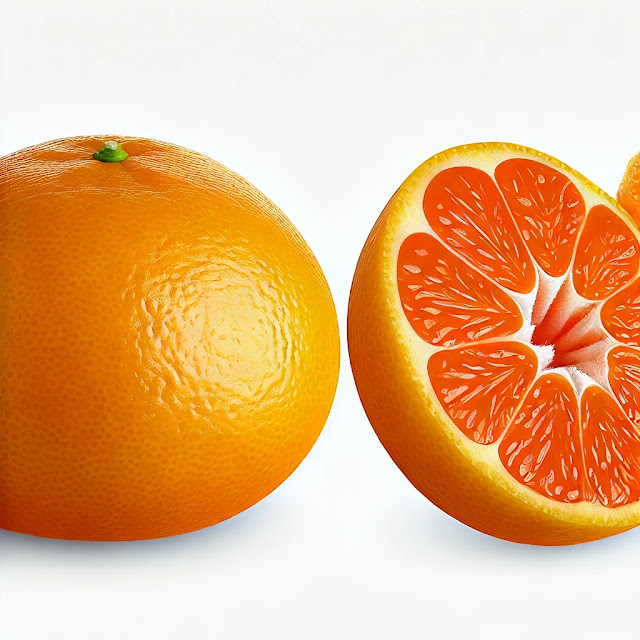Honeyberry 101: Nutrition, Health Benefits, and Creative Ways to Enjoy!
Introduction (Overview)
Honeyberry, also known as Haskap or Blue Honeysuckle, is a unique berry with an oblong shape, deep blue color, and a tart-sweet flavor reminiscent of blueberries and raspberries. Native to the cooler climates of northern Asia, Russia, and parts of North America, honeyberries are growing in popularity due to their rich antioxidant profile and versatile uses. In this blog, we’ll explore honeyberry’s nutritional content, health benefits, ways to enjoy it, and its cultural significance.
Calories and Key Nutrients (per 100g)
Honeyberries are nutrient-dense, making them a healthy addition to any diet. Here’s a look at the nutrition per 100 grams:
Calories (45 kcal): Low in calories, honeyberries provide only 45 calories per 100 grams, making them a light and nutritious snack.
Vitamin C (40 mg, 66% DV): Honeyberries are high in vitamin C, which supports the immune system, aids collagen production, and offers antioxidant protection.
Fiber (4.3 g, 17% DV): With a good fiber content, honeyberries aid digestion, help regulate blood sugar, and promote fullness.
Vitamin A (135 IU, 3% DV): Beneficial for eye health, skin health, and immune function.
Potassium (140 mg, 4% DV): Potassium helps regulate blood pressure, balance fluids, and support muscle function.
Anthocyanins and Polyphenols: Rich in antioxidants, particularly anthocyanins, honeyberries help protect cells from oxidative stress and reduce inflammation.
Honeyberries compare well with other berries like blueberries, offering similar antioxidants and higher vitamin C content.
Health Benefits of Honeyberry
Supports Immune Health
Honeyberries are rich in vitamin C and antioxidants, which help strengthen the immune system, reduce inflammation, and protect cells from damage.
Aids Digestive Health
The fiber in honeyberries promotes healthy digestion by aiding regular bowel movements and helping stabilize blood sugar levels.
Boosts Heart Health
Anthocyanins, the antioxidants responsible for honeyberries’ deep blue color, are known for supporting heart health by reducing blood pressure and improving cholesterol levels.
Supports Vision and Skin Health
The vitamin A content in honeyberries benefits eye health and skin vitality, while the antioxidants help protect skin from environmental damage.
Enhances Metabolic Health
With a balanced mix of fiber and antioxidants, honeyberries help stabilize blood sugar, making them beneficial for those managing diabetes or aiming for steady energy levels.
Recommended Ways to Consume Honeyberry
Honeyberries are versatile and can be enjoyed in various ways. Here are some popular methods:
Fresh and Raw: Enjoy honeyberries fresh for a simple and refreshing snack.
In Smoothies: Blend honeyberries with yogurt, banana, and honey for a flavorful smoothie.
As a Jam or Sauce: Cook honeyberries down with a touch of sugar and lemon to make a jam or sauce for toast or yogurt.
Creative Recipes with Honeyberry
Honeyberry Smoothie Bowl: Blend honeyberries with Greek yogurt, banana, and a dash of honey. Pour into a bowl and top with granola, chia seeds, and a few extra honeyberries for garnish.
Honeyberry Chia Jam: Simmer honeyberries with a bit of honey and chia seeds for a healthy, no-sugar-added jam perfect for spreading on toast.
Honeyberry Salad: Toss fresh honeyberries with mixed greens, feta cheese, walnuts, and a light balsamic vinaigrette for a balanced, tangy salad.
Precautions When Consuming Honeyberry
While honeyberries are generally safe, consider the following:
Allergies: Although rare, some people may be allergic to honeyberries. Symptoms could include itching, swelling, or digestive discomfort.
High Fiber Content: Due to their fiber content, consuming too many honeyberries at once may cause digestive discomfort in individuals unaccustomed to fiber-rich foods.
Comparison with Other Fruits
Compared to blueberries and raspberries, honeyberries offer a unique combination of high vitamin C and antioxidants, with a flavor profile that combines tartness and sweetness. Honeyberries also tend to have slightly more fiber and vitamin C, giving them a nutritional edge.
Who Should and Shouldn’t Consume Honeyberries
Good For: Honeyberries are suitable for those looking to support their immune health, improve digestion, or incorporate a nutrient-dense, low-calorie fruit into their diet.
Avoid If: Individuals with berry allergies or those sensitive to high-fiber foods may want to approach honeyberries cautiously and consume them in moderation.
Fun Facts and Interesting Stories
In Japan, honeyberries are known as “Haskap,” meaning “berry of long life.” Traditionally grown in the northern regions, they’ve been cherished for centuries and were believed to offer longevity benefits. In Russia, honeyberries are called “zhimolost” and have been used for jams and preserves for generations.
Honeyberry Culture Worldwide
In Japan, honeyberries are commonly enjoyed fresh or made into sweets and preserves. In Russia, they are popular in jams and liqueurs, while in North America, they are gaining traction in smoothies, sauces, and as a fresh snack.
Scientific Research on Honeyberries
Recent studies on honeyberries highlight their high antioxidant and anthocyanin content, which may support cardiovascular health and reduce inflammation. Research also suggests honeyberries could play a role in improving blood sugar regulation and offering protective effects against some chronic conditions due to their unique polyphenols and flavonoids.
Additional Information
Honeyberry extract is increasingly used in skincare products for its antioxidant benefits, which may help reduce signs of aging and promote a radiant complexion.
Conclusion
Honeyberries are a delicious and nutrient-packed fruit with numerous health benefits, from supporting immune health to improving digestion. Safe for most, honeyberries make a unique addition to any diet, though moderation is best for those new to high-fiber foods. This post is for informational purposes—please consult a healthcare provider if you have specific health concerns regarding honeyberry consumption.











Comments
Post a Comment